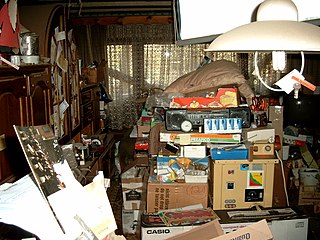
Hoarding disorder (HD) or Plyushkin's disorder, is a mental disorder characterised by persistent difficulty in parting with possessions and engaging in excessive acquisition of items that are not needed or for which no space is available. This results in severely cluttered living spaces, distress, and impairment in personal, family, social, educational, occupational, or other important areas of functioning. Excessive acquisition is characterized by repetitive urges or behaviours related to amassing or buying property. Difficulty discarding possessions is characterized by a perceived need to save items and distress associated with discarding them. Accumulation of possessions results in living spaces becoming cluttered to the point that their use or safety is compromised. It is recognised by the eleventh revision of the International Classification of Diseases (ICD-11) and the Diagnostic and Statistical Manual of Mental Disorders, 5th edition (DSM-5).
Housekeeping is the management and routine support activities of running and maintaining an organized physical institution occupied or used by people, like a house, ship, hospital or factory, such as cleaning, tidying/organizing, cooking, shopping, and bill payment. These tasks may be performed by members of the household, or by persons hired for the purpose. This is a more broad role than a cleaner, who is focused only on the cleaning aspect. The term is also used to refer to the money allocated for such use. By extension, it may also refer to an office or a corporation, as well as the maintenance of computer storage systems.
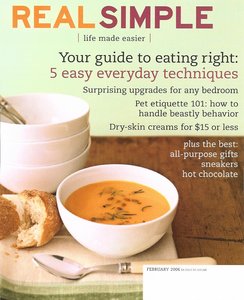
Real Simple is an American monthly magazine published by Dotdash Meredith. The magazine features articles and information related to homemaking, childcare, cooking, and emotional well-being. The magazine is distinguished by its clean, uncluttered style of layout and photos. In 2013 it had approximately 7.6 million readers, 90% of whom were women. Headquartered in New York City, the magazine is currently edited by Sarah Collins, who began serving as interim editor-in-chief in September 2016 after the departure of previous editor Kristin van Ogtrop.

Clean House is a home makeover and interior design television show, originally broadcast from 2003 until 2011 which aired 10 seasons of programs on the Style Network. Originally hosted by Niecy Nash and later by Tempestt Bledsoe, the show brings a four-person cleanup-and-renovation crew to the homes of families to clean up clutter.
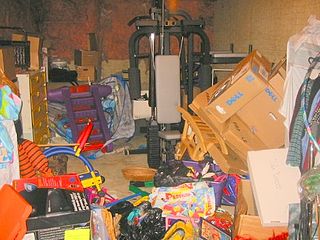
Decluttering means removing unnecessary items, sorting and arranging, or putting things back in place. This article deals with the clearing of places of residence, such as in homes and commercial buildings, but the principles can also be applied to other areas. The activity can be done independently, or with help from family, friends or professionals.
FlyLady is a support and self-help group that offers advice to help people with housekeeping, founded by "The FlyLady", Marla Cilley.
Joy Mangano is an American inventor and entrepreneur known for inventions such as the self-wringing Miracle Mop. She was the president of Ingenious Designs, LLC, and appeared regularly on the U.S. television shopping channel HSN until her departure in late 2018. Mangano is the founder and CEO of Clean Boss, a company that develops and sells cleaning products.

Grojband is a Canadian animated television series created by Todd Kauffman and Mark Thornton for Teletoon in Canada and Cartoon Network in the United States. Produced by Fresh TV and Neptoon Studios, with animation by Elliott Animation, in association with FremantleMedia Enterprises, it premiered on June 10, 2013, in the United States, on September 5, 2013, in Canada, and on April 21, 2014, in the United Kingdom. It is executive produced by Tom McGillis and Jennifer Pertsch, the creators of the hit animated reality franchise Total Drama.

Geralin Thomas is an American organizing consultant. She is best known for her appearances on the television show Hoarders. She is the proprietor of the company Metropolitan Organizing, based in Cary, North Carolina.

Marie Kondo, also known as Konmari (こんまり), is a Japanese organizing consultant, author, and TV presenter.
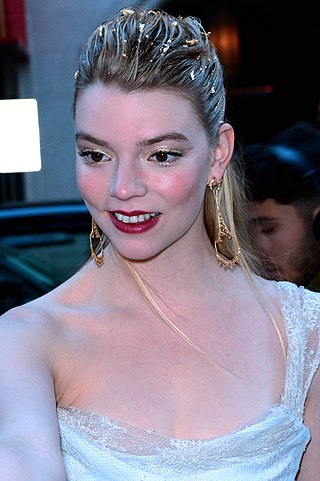
Anya-Josephine Marie Taylor-Joy is an actress. She has won several accolades, including a Golden Globe Award and a Screen Actors Guild Award, in addition to nominations for a BAFTA Film Award and a Primetime Emmy Award.
Scott Sonenshein is the Henry Gardiner Symonds Professor at the Jesse H. Jones School of Business, Rice University. He is an organizational psychologist that primarily uses field methodologies to examine questions around work and organizations. Sonenshein is also the author of the book Stretch: Unlock the Power of Less – and Achieve More than You Ever Imagined. His latest book is Joy at Work, co-written with Marie Kondo, which was released in 2020.
"Pork and Burns" is the eleventh episode of the twenty-eighth season of the American animated television series The Simpsons, and the 607th episode of the series overall. The episode was directed by Matthew Nastuk and written by Rob LaZebnik. It aired in the United States on Fox on January 8, 2017.

Back Street Girls is a Japanese manga series by Jasmine Gyuh. It is about three yakuza men forced by their boss to become a female idol group. It was serialized in Kodansha's seinen manga magazine Weekly Young Magazine from March 2015 to September 2018 and was compiled into 12 volumes. The manga is licensed digitally in English by Kodansha USA. A 10-episode anime television series adaptation, produced by J.C.Staff and directed by Chiaki Kon, aired from July to September 2018 on BS11 and other channels. A live-action adaptation, Back Street Girls: Gokudols, was released in February 2019.

Stephanie Land is an American author and public speaker. She is best known for writing Maid: Hard Work, Low Pay, and a Mother's Will to Survive (2019), which was adapted to television miniseries Maid (2021) for Netflix. Her second memoir, Class: A Memoir of Motherhood, Hunger, and Higher Education (2023) explores the challenges of single parenting and poverty while attending college. Land has also written several articles about maid service work, domestic abuse and poverty in the United States.
The 1st Critics' Choice Real TV Awards, presented by the Broadcast Television Journalists Association and NPACT, which recognizes excellence in nonfiction, unscripted and reality programming across broadcast, cable and streaming platforms, were held on June 2, 2019, at The Beverly Hilton in Los Angeles, California. The ceremony was streamed on VH1 on June 9. Loni Love served as the host of the ceremony.
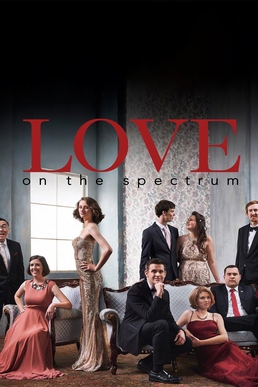
Love on the Spectrum is an Australian reality television show that follows people on the autism spectrum as they explore the dating world. The show is produced by Northern Pictures for ABC TV, and was made available to stream on ABC iview and Netflix.
Get Organized with The Home Edit is a 2020 reality streaming television series about The Home Edit, a professional organizing company founded by Clea Shearer and Joanna Teplin. It began with The Home Edit book, followed by home organization and lifestyle products, and the streaming series.

The Minimalists: Less Is Now is a 2021 American documentary film created for Netflix and directed by Matt D'Avella. The story focuses on two friends, Joshua Fields Millburn and Ryan Nicodemus, better known as the Minimalists, who demonstrate the benefits of living according to minimalism. The film was released on January 1, 2021, and was nominated for a Daytime Emmy in 2022.
Oni: Thunder God's Tale is an animated fantasy television limited series created by Daisuke "Dice" Tsutsumi for Netflix. Based on "Onari's Lullaby" by Emi Tsutsumi, and inspired by various Japanese folklore, the series tells a story of Onari, who sets on a path of becoming one of the folklore heroes, protecting her peaceful village from the mysterious oni. Produced by Tonko House and animated by Megalis VFX and Dwarf Studios, the series premiered on October 21, 2022.













